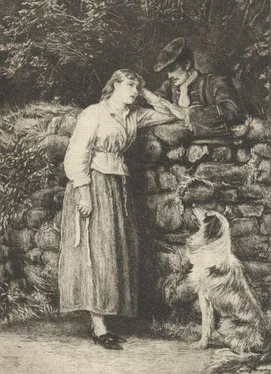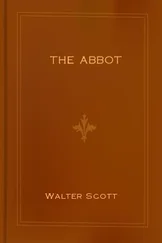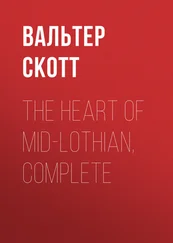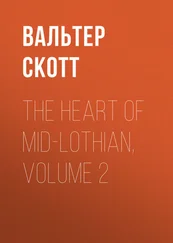Walter Scott - The Heart of Mid-Lothian
Здесь есть возможность читать онлайн «Walter Scott - The Heart of Mid-Lothian» весь текст электронной книги совершенно бесплатно (целиком полную версию без сокращений). В некоторых случаях можно слушать аудио, скачать через торрент в формате fb2 и присутствует краткое содержание. Год выпуска: 2004, Жанр: Исторические приключения, на английском языке. Описание произведения, (предисловие) а так же отзывы посетителей доступны на портале библиотеки ЛибКат.
- Название:The Heart of Mid-Lothian
- Автор:
- Жанр:
- Год:2004
- ISBN:нет данных
- Рейтинг книги:3 / 5. Голосов: 1
-
Избранное:Добавить в избранное
- Отзывы:
-
Ваша оценка:
- 60
- 1
- 2
- 3
- 4
- 5
The Heart of Mid-Lothian: краткое содержание, описание и аннотация
Предлагаем к чтению аннотацию, описание, краткое содержание или предисловие (зависит от того, что написал сам автор книги «The Heart of Mid-Lothian»). Если вы не нашли необходимую информацию о книге — напишите в комментариях, мы постараемся отыскать её.
The Heart of Mid-Lothian — читать онлайн бесплатно полную книгу (весь текст) целиком
Ниже представлен текст книги, разбитый по страницам. Система сохранения места последней прочитанной страницы, позволяет с удобством читать онлайн бесплатно книгу «The Heart of Mid-Lothian», без необходимости каждый раз заново искать на чём Вы остановились. Поставьте закладку, и сможете в любой момент перейти на страницу, на которой закончили чтение.
Интервал:
Закладка:
"O ye unhappy boy," said Jeanie, "do ye ken what will come o' ye when ye die?"
"I shall neither feel cauld nor hunger more," said the youth doggedly.
"To let him be execute in this dreadful state of mind would be to destroy baith body and soul—and to let him gang I dare not—what will be done?— But he is my sister's son—my own nephew—our flesh and blood—and his hands and feet are yerked as tight as cords can be drawn.—Whistler, do the cords hurt you?"
"Very much."
"But, if I were to slacken them, you would harm me?"
"No, I would not—you never harmed me or mine."
There may be good in him yet, thought Jeanie; I will try fair play with him.
She cut his bonds—he stood upright, looked round with a laugh of wild exultation, clapped his hands together, and sprung from the ground, as if in transport on finding himself at liberty. He looked so wild, that Jeanie trembled at what she had done.
"Let me out," said the young savage.
"I wunna, unless you promise"
"Then I'll make you glad to let us both out."
He seized the lighted candle and threw it among the flax, which was instantly in a flame. Jeanie screamed, and ran out of the room; the prisoner rushed past her, threw open a window in the passage, jumped into the garden, sprung over its enclosure, bounded through the woods like a deer, and gained the seashore. Meantime, the fire was extinguished, but the prisoner was sought in vain. As Jeanie kept her own secret, the share she had in his escape was not discovered: but they learned his fate some time afterwards—it was as wild as his life had hitherto been.
The anxious inquiries of Butler at length learned, that the youth had gained the ship in which his master, Donacha, had designed to embark. But the avaricious shipmaster, inured by his evil trade to every species of treachery, and disappointed of the rich booty which Donacha had proposed to bring aboard, secured the person of the fugitive, and having transported him to America, sold him as a slave, or indented servant, to a Virginian planter, far up the country. When these tidings reached Butler, he sent over to America a sufficient sum to redeem the lad from slavery, with instructions that measures should be taken for improving his mind, restraining his evil propensities, and encouraging whatever good might appear in his character. But this aid came too late. The young man had headed a conspiracy in which his inhuman master was put to death, and had then fled to the next tribe of wild Indians. He was never more heard of; and it may therefore be presumed that he lived and died after the manner of that savage people, with whom his previous habits had well fitted him to associate.
All hopes of the young man's reformation being now ended, Mr. and Mrs. Butler thought it could serve no purpose to explain to Lady Staunton a history so full of horror. She remained their guest more than a year, during the greater part of which period her grief was excessive. In the latter months, it assumed the appearance of listlessness and low spirits, which the monotony of her sister's quiet establishment afforded no means of dissipating. Effie, from her earliest youth, was never formed for a quiet low content. Far different from her sister, she required the dissipation of society to divert her sorrow, or enhance her joy. She left the seclusion of Knocktarlitie with tears of sincere affection, and after heaping its inmates with all she could think of that might be valuable in their eyes. But she did leave it; and, when the anguish of the parting was over, her departure was a relief to both sisters.
The family at the Manse of Knocktarlitie, in their own quiet happiness, heard of the well-dowered and beautiful Lady Staunton resuming her place in the fashionable world. They learned it by more substantial proofs, for David received a commission; and as the military spirit of Bible Butler seemed to have revived in him, his good behaviour qualified the envy of five hundred young Highland cadets, "come of good houses," who were astonished at the rapidity of his promotion. Reuben followed the law, and rose more slowly, yet surely. Euphemia Butler, whose fortune, augmented by her aunt's generosity, and added to her own beauty, rendered her no small prize, married a Highland laird, who never asked the name of her grand-father, and was loaded on the occasion with presents from Lady Staunton, which made her the envy of all the beauties in Dumbarton and Argyle shires.
After blazing nearly ten years in the fashionable world, and hiding, like many of her compeers, an aching heart with a gay demeanour—after declining repeated offers of the most respectable kind for a second matrimonial engagement, Lady Staunton betrayed the inward wound by retiring to the Continent, and taking up her abode in the convent where she had received her education. She never took the veil, but lived and died in severe seclusion, and in the practice of the Roman Catholic religion, in all its formal observances, vigils, and austerities.
Jeanie had so much of her father's spirit as to sorrow bitterly for this apostasy, and Butler joined in her regret. "Yet any religion, however imperfect," he said, "was better than cold scepticism, or the hurrying din of dissipation, which fills the ears of worldlings, until they care for none of these things."
Meanwhile, happy in each other, in the prosperity of their family, and the love and honour of all who knew them, this simple pair lived beloved, and died lamented.
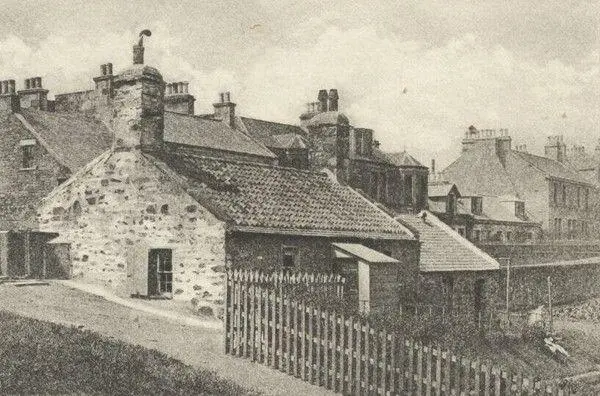
READER,
THIS TALE WILL NOT BE TOLD IN VAIN, IF IT SHALL BE FOUND TO ILLUSTRATE THE GREAT TRUTH, THAT GUILT, THOUGH IT MAY ATTAIN TEMPORAL SPLENDOUR, CAN NEVER CONFER REAL HAPPINESS; THAT THE EVIL CONSEQUENCES OF OUR CRIMES LONG SURVIVE THEIR COMMISSION, AND, LIKE THE GHOSTS OF THE MURDERED, FOR EVER HAUNT THE STEPS OF THE MALEFACTOR; AND THAT THE PATHS OF VIRTUE, THOUGH SELDOM THOSE OF WORLDLY GREATNESS, ARE ALWAYS THOSE OF PLEASANTNESS AND PEACE.
L'ENVOY,
BY JEDEDIAH CLEISHBOTHAM.
Thus concludeth the Tale of "The Heart of Mid-Lothian," which hath filled more pages than I opined. The Heart of Mid-Lothian is now no more, or rather it is transferred to the extreme side of the city, even as the Sieur Jean Baptiste Poquelin hath it, in his pleasant comedy called Le Me'decin Malgre' Lui, where the simulated doctor wittily replieth to a charge, that he had placed the heart on the right side, instead of the left, " Cela e'tait autrefois ainsi, mais nous avons change' tout cela. " Of which witty speech if any reader shall demand the purport, I have only to respond, that I teach the French as well as the Classical tongues, at the easy rate of five shillings per quarter, as my advertisements are periodically making known to the public.
NOTES TO THE HEART OF MID-LOTHIAN.
NOTE A—AUTHOR'S CONNECTION WITH QUAKERISM
It is an old proverb, that "many a true word is spoken in jest." The existence of Walter Scott, third son of Sir William Scott of Harden, is instructed, as it is called, by a charter under the great seal, Domino Willielmo Scott de Harden Militi, et Waltero Scott suo filio legitimo tertio genito, terrarum de Roberton. [68]
The munificent old gentleman left all his four sons considerable estates. and settled those of Eilrig and Raeburn, together with valuable possessions around Lessuden, upon Walter, his third son, who is ancestor of the Scotts of Raeburn, and of the Author of Waverley. He appears to have become a convert to the doctrine of the Quakers, or Friends, and a great assertor of their peculiar tenets. This was probably at the time when George Fox, the celebrated apostle of the sect, made an expedition into the south of Scotland about 1657, on which occasion, he boasts, that "as he first set his horse's feet upon Scottish ground, he felt the seed of grace to sparkle about him like innumerable sparks of fire." Upon the same occasion, probably, Sir Gideon Scott of Highchester, second son of Sir William, immediate elder brother of Walter, and ancestor of the author's friend and kinsman, the present representative of the family of Harden, also embraced the tenets of Quakerism. This last convert, Gideon, entered into a controversy with the Rev. James Kirkton, author of the Secret and True History of the Church of Scotland, which is noticed by my ingenious friend Mr. Charles Kirkpatrick Sharpe, in his valuable and curious edition of that work, 4to, 1817. Sir William Scott, eldest of the brothers, remained, amid the defection of his two younger brethren, an orthodox member of the Presbyterian Church, and used such means for reclaiming Walter of Raeburn from his heresy, as savoured far more of persecution than persuasion. In this he was assisted by MacDougal of Makerston, brother to Isabella MacDougal, the wife of the said Walter, and who, like her husband, had conformed to the Quaker tenets.
Читать дальшеИнтервал:
Закладка:
Похожие книги на «The Heart of Mid-Lothian»
Представляем Вашему вниманию похожие книги на «The Heart of Mid-Lothian» списком для выбора. Мы отобрали схожую по названию и смыслу литературу в надежде предоставить читателям больше вариантов отыскать новые, интересные, ещё непрочитанные произведения.
Обсуждение, отзывы о книге «The Heart of Mid-Lothian» и просто собственные мнения читателей. Оставьте ваши комментарии, напишите, что Вы думаете о произведении, его смысле или главных героях. Укажите что конкретно понравилось, а что нет, и почему Вы так считаете.
